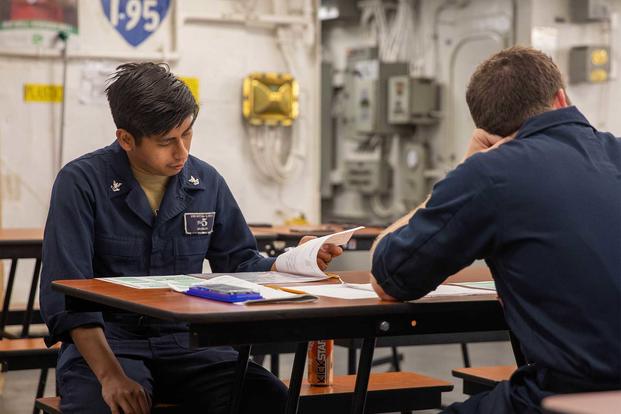There are many factors involved in Enlisted Navy Advancement included with your score on the Navy-Wide Advancement Exam (NWAE). As detailed in BUPERSINST 1430.16G (CH 1), the Advancement Manual for Enlisted Personnel of the U.S. Navy and U.S. Navy Reserve, there are nine factors involved in being advanced as a part of taking the Navy-Wide Advancement Exam. Listed below is a brief overview of those requirements.
First, a pair of facets impacts your ability to take or “sit” the test at all.
Time in Paygrade. Primarily, you must wait a minimum amount of time between each advancement opportunity. These wait times differ by paygrade and can be impacted by your performance evaluations. However, sailors who receive high-performance evaluation marks (i.e., “Early Promote”) can be eligible to take the exam ahead of their normal wait times.
Command Recommendation. All other factors aside, if you do not have a “promotable” or above promotion recommendation, you cannot take the Navy-Wide Advancement Exam. This regulation is intentionally designed to allow commanding officers to react to last-minute changes in the sailor’s performance in the event a serious lapse in their conduct occurs.
If you meet those requirements and can sit the test, you also must take into account the components that impact your overall score for the Navy-Wide Advancement Exam:
Performance Mark Average (PMA). This “factor” is based on your performance marks (block 45) of all evaluation reports (including Frocked) for that rank, which are then averaged and converted to a decimal with a max value of 4.0. Afterward, this PMA factor is multiplied by a rank-specific number (please see Table 1-1 for the specific math involved). When going up for E4/E5 exams, these combined numbers represent up to 36% of your overall Final Multiple Score (FMS). For those going for the E6 exam, this carries a 50% weight on your FMS and 60% for those going for chief.
Standard Score (SS). This score reflects how you performed on the specific exam, and it has a maximum value of 80 points toward your FMS. Think of this as your test score, which is a significant part of your overall FMS.
Awards. Certain military awards are given a point value toward your FMS. For those going for the E4/E5 exams, they can get a max of 10 points toward their FMS. Those going for the E6 exam can earn 12 points. (Note: Those going for chief petty officer cannot count award points toward their FMS.)
Individual Augmentee (IA). For those sailors who have 90+ days of “Boots on Ground” in a designated Combat Zone/Contingency Operations Area, up to two points for E4-E6 candidates can be added to their FMS.
Passed/Not Advanced (PNA). For those who passed the previous five exams, the Navy awards up to 15 points (E4-E6 candidates only) toward their FMS for those who scored in the top 25% of their Standard Score.
Service in Paygrade (SIPG). For E4/E5 candidates, up to two points can be awarded toward your FMS, and for E6 candidates, up to three points can be awarded. This number is calculated by dividing the time in your current paygrade by four.
Education. For all E4-E6 candidates, up to two points can be awarded for an associate’s degree, and an additional two points can be added for the completion of a bachelor's degree.
While there are many factors that make up your FMS that you cannot fully impact, your Standard Score is something that is 100% under your control. A few more correct questions on your exam could make up for a missed IA opportunity, a few awards or even some service in paygrade deficiencies.
Time dedicated to studying for the Navy-Wide Advancement Exam has the potential to increase your FMS significantly, even if other areas of your FMS factors are not competitive.
Learn More About the Navy-Wide Advancement Exam
Need more help with the Navy-Wide Advancement Exam? Check out Bluejacketeer, which gathers and prepares material for your rating with a convenient mobile app and offline study mode so you can learn anywhere.















